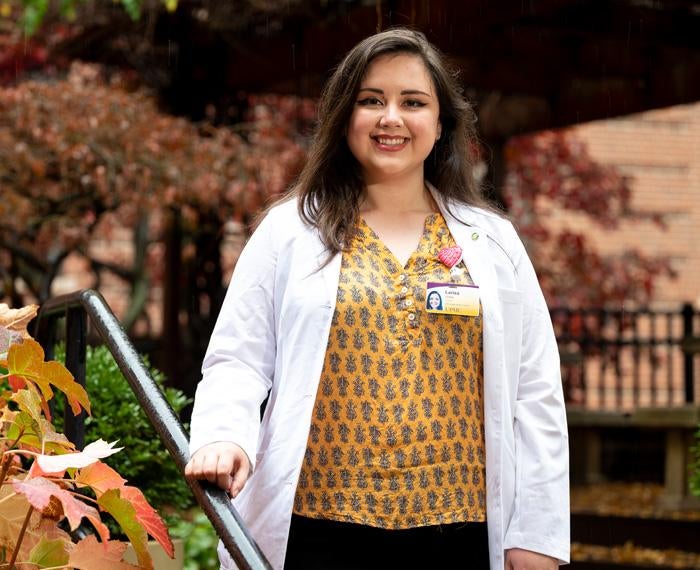
Subscribe to Pittwire Today
Get the most interesting and important stories from the University of Pittsburgh.How the pandemic inspired this Pitt student to pursue a career in public health

One night early in the pandemic, Larisa Garza Chapa blew up her group chat until 3 a.m. A friend had messaged that COVID-19 wasn’t real, and she was not going to let it slide. Garza Chapa, the daughter of a doctor, had been paying close attention to the emerging crisis, probably earlier than her peers, she said.
She stayed up all night posting facts, figures and links to the Centers for Disease Control and Prevention’s website to prove her point — that the virus was a serious, deadly threat.
Two years later, Garza Chapa is a second-year Master of Public Health student in Pitt’s School of Public Health specializing in infectious disease development, eradication and laboratory practice — and she is well on her way to a career that will help prevent future pandemics.
Education in action
For Garza Chapa, the pandemic was the “big push” she needed when choosing her graduate school path.
“What hooked me on attending Pitt was the School of Public Health’s option for an infectious disease and microbiology focus, one of just a few in the country, and the variety of practicum opportunities offered,” Garza Chapa said.
Students enrolled in the Master of Public Health program complete 200 practicum hours at local and state agencies and organizations, applying their classroom learning to boots-on-the-ground experiences.
“Practicums are an invaluable opportunity to discover that expertise resides in many places,” said Elias Thistle, director of community engagement in at Pitt Public Health.
“The community members and the organizations we serve have wisdom that, when partnered with student’s formal education, helps them make an impact in those groups and public health overall,” she added.
The School of Public Health coordinates practicum placements with three organizations: the Pittsburgh Summer Institute, a stipend-supported behind-the-scenes look at the Allegheny County Health Department’s operations; Bridging the Gaps, a full-time, paid, interdisciplinary program promoting health in underserved communities; and EXPO programs from the Mid-Atlantic Regional Public Health Training Center, a stipend-supported experiential learning opportunity with a focus on field placements and collaborative projects with University faculty.
Students can also connect with potential placement sites at Pitt Public Health’s annual practicum/intern fair.
“Over the last two and a half decades, the School of Public Health has formed true partnerships with community groups and organizations. The benefits are reciprocal,” said Elias.
Enacting lasting change
In the summer between her first and second year of graduate school, Garza Chapa completed an eight-week Bridging the Gaps practicum supporting the Council of Three Rivers American Indian Center’s Early Head Start program.
She and her practicum partner, Yousuf Al-Abduladheem, a Pitt pharmacy PhD student, were tasked with revising the center’s teacher onboarding manual to build staff consensus, update organizational policies and educate classroom teachers about health-related subjects, including the importance of vaccines.
The Early Head Start program serves pregnant people and infants up to age three; though the initiative is housed at the Council of Three Rivers American Indian Center, all low socioeconomic, racial and ethnic identities can receive services.
She and Al-Abduladheem augmented the center’s onboarding manual with guides to identifying diseases and ailments on a diverse range of skin colors — for example, on darker pigmented skin, tick bites are recognized by bumps or ridging around the bites, and not the appearance of a red circle surrounding the wound. They also added information on recognizing when a dark-skinned person is turning blue due to lack of oxygen and how to read a label on a bottle of medicine — crucial skills for childcare providers.
Ready to launch
Earning a Master of Public Health opens the door to a host of jobs for Garza Chapa, from health communications to becoming an intervention specialist or working in health policy analysis roles, to name a few. But the focus of her latest practicum placement at UPMC Magee-Womens Hospital has her leaning toward working in the field of infection prevention and global outbreak containment.
At Magee, Garza Chapa is continuing to infuse her work with an eye toward addressing health disparities and accessibility. She’s evaluating doctor and staff adherence to the site’s blood-borne pathogen exposure plan and hand hygiene practices and updating the language of the blood-borne exposure plan to reflect a fifth grade reading level, which will increase comprehension.
“Public health touches communities, governments and hospital settings — an enormous scope of people,” she said. “I want to be a part of making things better.”
— Nichole Faina, photography by Tom Altany
Interested in a career in public health?
It’s a new era for Pitt Public Health, which now offers undergraduate, master’s and PhD programs customized to suit your career goals. Learn more about the teaching, research and community engagement at the school and see the deadlines to apply.

